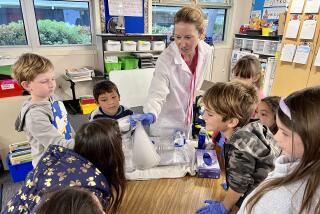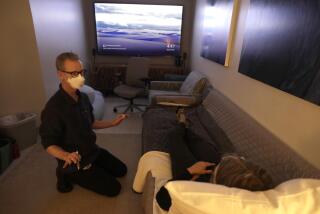Academic Panel May Yet Turn to Nobelists
- Share via
The commission working on the first statewide academic standards for California’s public schools is reconsidering its decision to reject an offer from three Nobel Prize-winning chemists to help write science standards for students.
The California Commission for the Establishment of Academic Content and Performance Standards has scheduled a special meeting for Monday to act on a staff recommendation that it reopen the competition for the job of writing science standards for primary and secondary classrooms.
Earlier this month, the commission awarded a contract for $178,000 to a group of scientists and educators based at Cal State San Bernardino.
In doing so, it turned down a competing proposal submitted by a group that included the three Nobelists as well as more than 30 other scientists and classroom teachers from across the nation. That group offered to write the standards for free, then protested its rejection, arguing that the commission had not followed its own rules for evaluating the two proposals.
Although the appeal was based on technical irregularities, the two groups represent competing approaches to science education.
The group that includes the Nobelists as principal members is worried that science instruction is being watered down in an attempt to appeal to a broader audience of students. Those in the San Bernardino group say their intent is not to make science lessons less rigorous but to teach them in ways that make the material easier to grasp, especially for the vast majority of students who do not plan to pursue careers in science.
After the commission’s action, Assemblyman Steve Baldwin (R-El Cajon) demanded the release of the four evaluations of the competing proposals.
Those evaluations--three written by commissioners and the other by a consultant--show skepticism of the offer by the Associated Scientists, which included the three Nobel laureates.
None of the evaluators were identified by name but one wrote that the group’s motives were “highly suspect” because it wanted to work for free. The same evaluator worried that the scientists’ passion for their subject made it “unlikely they will be responsive to directions” from the standards’ commission.
The group that included the Nobelists received an average score of 43 out of 115. The other group won the contract by scoring 81.
But the evaluators also had qualms about that group’s qualifications. One said that the team had professors with “lots of education degrees” but insufficient expertise in science.
In the wake of the controversy, the commission’s staff has recommended that it start the selection process over--prompting the commission to schedule next week’s meeting on the matter.
“We will ask the commissioners to consider rejecting all bids and reopen [the process],” said Scott Hill, the commission’s executive director.
Hill said he made his recommendation after consulting with lawyers.
The three Nobel Prize-winners who volunteered their services to the project are Glenn T. Seaborg, Dudley R. Hershbach and Henry Taube. Seaborg, 87, a former chancellor at UC Berkeley, has long been a leading voice warning about the sad state of America’s public schools, having co-chaired the panel that wrote the landmark 1983 report “A Nation at Risk.”
More to Read
Sign up for Essential California
The most important California stories and recommendations in your inbox every morning.
You may occasionally receive promotional content from the Los Angeles Times.













